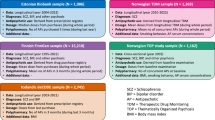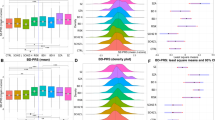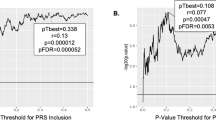Abstract
Risperidone is a widely used atypical antipsychotic agent that produces considerable interindividual differences in patient response. We investigated the pharmacogenetic relationship between the brain-derived neurotrophic factor (BDNF) gene and response to risperidone in 127 Han Chinese schizophrenic patients. Three functional polymorphisms, (GT)n dinucleotide repeat polymorphism, C-270T, and the rs6265G/A single-nucleotide polymorphism (SNP), were genotyped and analyzed for association, with reduction of Brief Psychiatric Rating Scale (BPRS) scores following an 8-week period of risperidone monotherapy. For individual polymorphic analysis, we found that the frequency of the 230-bp allele of the (GT)n polymorphism was much higher in responders (47.95%) than in nonresponders (32.41%) and the difference was statistically significant even after Bonferroni's adjustment (for the 230-bp allele: adjusted P=0.039). For haplotype-based analyses of the three polymorphisms, no positive finding was observed in the global test, but in specific haplotype tests, two haplotypes were also significantly related to response to risperidone (for haplotype 230-bp/C-270/rs6265G: P=0.0009; for haplotype 234-bp/C-270/rs6265A: P=0.043), indicating that patients with the 230-bp allele of the (GT)n polymorphism or the 230-bp/C-270/rs6265G haplotype responded better to risperidone than those with other alleles or haplotypes, and that the positive effect of the individual haplotype 230-bp/C-270/rs6265G was mainly driven by the 230-bp allele. These findings demonstrate that the individual and combinatorial genetic variants in the BDNF gene might have a role in the therapeutic response to risperidone in the Han Chinese population.
Similar content being viewed by others
Log in or create a free account to read this content
Gain free access to this article, as well as selected content from this journal and more on nature.com
or
References
Csernansky JG, Mahmoud R, Brenner R : Risperidone-USA-79 Study Group. A comparison of risperidone and haloperidol for the prevention of relapse in patients with schizophrenia. N Engl J Med 2002; 346: 16–22.
Leucht S, Corves C, Arbter D, Engel RR, Li C, Davis JM : Second-generation versus first-generation antipsychotic drugs for schizophrenia: a meta-analysis. Lancet 2009; 373: 31–41.
Lane HY, Liu YC, Huang CL et al: Risperidone-related weight gain: genetic and nongenetic predictors. J Clin Psychopharmacol 2006; 26: 128–134.
Stroup TS : Heterogeneity of treatment effects in schizophrenia. Am J Med 2007; 120 (4 Suppl 1): S26–S31.
Xing Q, Gao R, Li H et al: Polymorphisms of the ABCB1 gene are associated with the therapeutic response to risperidone in Chinese schizophrenia patients. Pharmacogenomics 2006; 7: 987–993.
Xing Q, Qian X, Li H et al: The relationship between the therapeutic response to risperidone and the dopamine D2 receptor polymorphism in Chinese schizophrenia patients. Int J Neuropsychopharmacol 2007; 10: 631–637.
Wang L, Yu L, He G et al: Response of risperidone treatment may be associated with polymorphisms of HTT gene in Chinese schizophrenia patients. Neurosci Lett 2007; 414: 1–4.
Zhang A, Xing Q, Wang L et al: Dopamine transporter polymorphisms and risperidone response in Chinese schizophrenia patients: an association study. Pharmacogenomics 2007; 8: 1337–1345.
Xuan J, Zhao X, He G et al: Effects of the dopamine D3 receptor (DRD3) gene polymorphisms on risperidone response: a pharmacogenetic study. Neuropsychopharmacology 2008; 33: 305–311.
Gu B, Wang L, Zhang AP et al: Association between a polymorphism of the HTR3A gene and therapeutic response to risperidone treatment in drug-naive Chinese schizophrenia patients. Pharmacogenet Genomics 2008; 18: 721–727.
Zhang XY, Zhou DF, Wu GY et al: BDNF levels and genotype are associated with antipsychotic-induced weight gain in patients with chronic schizophrenia. Neuropsychopharmacology 2008; 33: 2200–2205.
Chlan-Fourney J, Ashe P, Nylen K, Juorio AV, Li XM : Differential regulation of hippocampal BDNF mRNA by typical and atypical antipsychotic administration. Brain Res 2002; 954: 11–20.
Pillai A, Terry Jr AV, Mahadik SP : Differential effects of long-term treatment with typical and atypical antipsychotics on NGF and BDNF levels in rat striatum and hippocampus. Schizophr Res 2006; 82: 95–106.
Zhang XY, Tan YL, Zhou DF et al: Serum BDNF levels and weight gain in schizophrenic patients on long-term treatment with antipsychotics. J Psychiatr Res 2007; 41: 997–1004.
Rizos EN, Papadopoulou A, Laskos E et al: Reduced serum BDNF levels in patients with chronic schizophrenic disorder in relapse, who were treated with typical or atypical antipsychotics. World J Biol Psychiatry 2008; 10: 1–5.
Lee BH, Kim YK : Increased plasma brain-derived neurotropic factor, not nerve growth factor-Beta, in schizophrenia patients with better response to risperidone treatment. Neuropsychobiology 2009; 59: 51–58.
Egan MF, Kojima M, Callicott JH et al: The BDNF val66met polymorphism affects activity-dependent secretion of BDNF and human memory and hippocampal function. Cell 2003; 112: 257–269.
Xu MQ, St Clair D, Feng GY et al: BDNF gene is a genetic risk factor for schizophrenia and is related to the chlorpromazine-induced extrapyramidal syndrome in the Chinese population. Pharmacogenet Genomics 2008; 18: 449–457.
Krebs MO, Guillin O, Bourdell MC et al: Brain derived neurotrophic factor (BDNF) gene variants association with age at onset and therapeutic response in schizophrenia. Mol Psychiatry 2000; 5: 558–562.
Hong CJ, Yu YW, Lin CH, Tsai SJ : An association study of a brain-derived neurotrophic factor Val66Met polymorphism and clozapine response of schizophrenic patients. Neurosci Lett 2003; 349: 206–208.
Liou YJ, Liao DL, Chen JY et al: Association analysis of the dopamine D3 receptor gene ser9gly and brain-derived neurotrophic factor gene val66met polymorphisms with antipsychotic-induced persistent tardive dyskinesia and clinical expression in Chinese schizophrenic patients. Neuromolecular Med 2004; 5: 243–251.
Anttila S, Illi A, Kampman O, Mattila KM, Lehtimäki T, Leinonen E : Lack of association between two polymorphisms of brain-derived neurotrophic factor and response to typical neuroleptics. J Neural Transm 2005; 112: 885–890.
Xu MQ, St Clair D, Ott J, Feng GY, He L : Brain-derived neurotrophic factor gene C-270T and Val66Met functional polymorphisms and risk of schizophrenia: a moderate-scale population-based study and meta-analysis. Schizophr Res 2007; 91: 6–13.
Chao HM, Kao HT, Porton B : BDNF Val66Met variant and age of onset in schizophrenia. Am J Med Genet B Neuropsychiatr Genet 2008; 147: 505–506.
Zhang XY, Zhou DF, Wu GY et al: BDNF levels and genotype are associated with antipsychotic-induced weight gain in patients with chronic schizophrenia. Neuropsychopharmacology 2008; 33: 2200–2205.
Ho BC, Andreasen NC, Dawson JD, Wassink TH : Association between brain-derived neurotrophic factor Val66Met gene polymorphism and progressive brain volume changes in schizophrenia. Am J Psychiatry 2007; 164: 1890–1899.
Kang SG, Choi JE, An H et al: No association between the brain-derived neurotrophic factor gene Val66Met polymorphism and tardive dyskinesia in schizophrenic patients. Prog Neuropsychopharmacol Biol Psychiatry 2008; 32: 1545–1548.
Rybakowski JK : BDNF gene: functional Val66Met polymorphism in mood disorders and schizophrenia. Pharmacogenomics 2008; 9: 1589–1593.
Overall JE, Gorham DR : The brief psychiatric rating scale. Psychol Rep 1962; 10: 799–812.
Lachar D, Bailley SE, Rhoades HM, Varner RV : Use of BPRS-A percent change scores to identify significant clinical improvement: accuracy of treatment response classification in acute psychiatric inpatients. Psychiatry Res 1999; 89: 259–268.
Kumra S, Kranzler H, Gerbino-Rosen G et al: Clozapine and ‘high-dose’ olanzapine in refractory early-onset schizophrenia: a 12-week randomized and double-blind comparison. Biol Psychiatry 2008; 63: 524–529.
Zalsman G, Frisch A, Lev-Ran S et al: DRD4 exon III polymorphism and response to risperidone in Israeli adolescents with schizophrenia: a pilot pharmacogenetic study. Eur Neuropsychopharmacol 2003; 13: 183–185.
Sakumoto N, Kondo T, Mihara K, Suzuki A, Yasui-Furukori N : Dopamine D2 receptor gene polymorphisms predict well the response to dopamine antagonists at therapeutic dosages in patients with schizophrenia. Psychiatry Clin Neurosci 2007; 61: 174–180.
LLerena A, Berecz R, Dorado P et al: Determination of risperidone and 9-hydroxyrisperidone in human plasma by liquid chromatography: application to the evaluation of CYP2D6 drug interactions. J Chromatogr B Analyt Technol Biomed Life Sci 2003; 783: 213–219.
Barrett JC, Fry B, Maller J, Daly MJ : Haploview: analysis and visualization of LD and haplotype maps. Bioinformatics 2005; 21: 263–265.
Stephens M, Smith NJ, Donnelly P : A new statistical method for haplotype reconstruction from population data. Am J Hum Genet 2001; 68: 978–989.
Erdfelder E, Faul F, Buchner A : *Power: a general power analysis program. Behav Res Methods Instrum Comput 1996; 28: 1–11.
Becker T, Knapp M : A powerful strategy to account for multiple testing in the context of haplotype analysis. Am J Hum Genet 2004; 75: 561–570.
Gomez A, Ingelman-Sundberg M : Pharmacoepigenetics: its role in interindividual differences in drug response. Clin Pharmacol Ther 2009; 85: 426–430.
Guillin O, Diaz J, Carroll P, Griffon N, Schwartz JC, Sokoloff P : BDNF controls dopamine D3 receptor expression and triggers behavioural sensitization. Nature 2001; 411: 86–89.
Martinowich K, Lu B : Interaction between BDNF and serotonin: role in mood disorders. Neuropsychopharmacology 2008; 33: 73–83.
Gourion D, Goldberger C, Leroy S, Bourdel MC, Olié JP, Krebs MO : Age at onset of schizophrenia: interaction between brain-derived neurotrophic factor and dopamine D3 receptor gene variants. Neuroreport 2005; 16: 1407–1410.
Acknowledgements
This work was supported by grants (2006AA02A407, 2006CB910601, 2006BAI05A05, 2007CB947300, and 07DZ22917), by the Shanghai Leading Academic Discipline Project (B205), and by the Shanghai Municipality Science & Technology Commission (05JC14090). We are grateful to all participants and to the psychiatrists and mental health workers who participated in this project.
Author information
Authors and Affiliations
Corresponding authors
Ethics declarations
Competing interests
The authors declare no conflict of interest.
Rights and permissions
About this article
Cite this article
Xu, M., Li, S., Xing, Q. et al. Genetic variants in the BDNF gene and therapeutic response to risperidone in schizophrenia patients: a pharmacogenetic study. Eur J Hum Genet 18, 707–712 (2010). https://doi.org/10.1038/ejhg.2009.238
Received:
Revised:
Accepted:
Published:
Issue date:
DOI: https://doi.org/10.1038/ejhg.2009.238
Keywords
This article is cited by
-
A Novel Mutation in the MAP7D3 Gene in Two Siblings with Severe Intellectual Disability and Autistic Traits: Concurrent Assessment of BDNF Functional Polymorphism, X-Inactivation and Oxidative Stress to Explain Disease Severity
Journal of Molecular Neuroscience (2023)
-
BDNF Val66Met polymorphism and clinical response to antipsychotic treatment in schizophrenia and schizoaffective disorder patients: a meta-analysis
The Pharmacogenomics Journal (2019)
-
Genetics and Antipsychotic Response in Schizophrenia: an Update
Current Behavioral Neuroscience Reports (2017)
-
The BDNF gene Val66Met polymorphism as a modifier of psychiatric disorder susceptibility: progress and controversy
Molecular Psychiatry (2015)
-
Association between the brain-derived neurotrophic factor Val66Met polymorphism and therapeutic response to olanzapine in schizophrenia patients
Psychopharmacology (2014)



